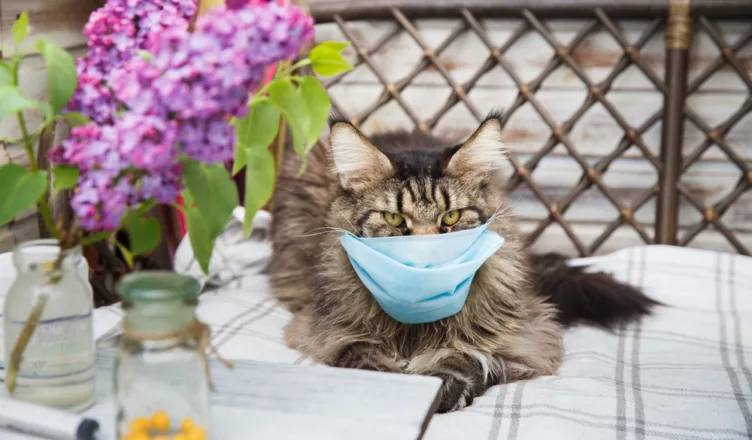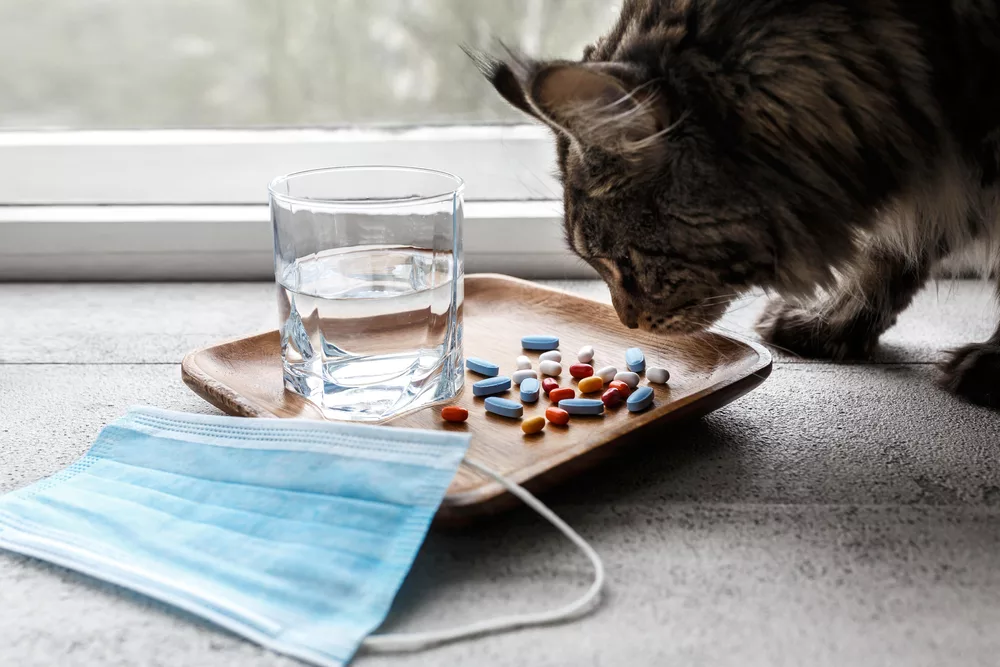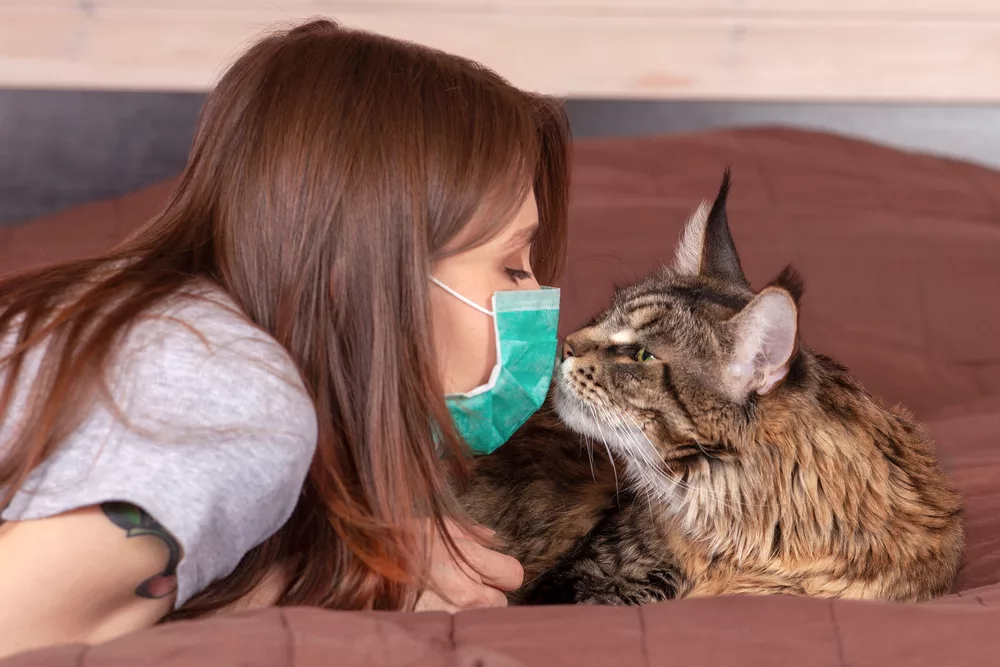Maine Coons are one of the oldest natural cat breeds and one of the biggest cats in the world, known for their gentle nature, large size, and striking appearance. Maine origin makes the Maine Coon the subject of American pride. However, these majestic felines can be prone to allergies, negatively impacting their health and well-being. Here we will discuss What are Maine Coon Allergies? the causes, symptoms, preventive measures, and hypoallergenic cat food options.
Understanding Allergies in Maine Coon Cats
Allergies are the immune system’s response to any foreign substances that are typically harmless. In Maine Coon cats, these substances can come from their environment or diet. When a Maine Coon cat’s immune system identifies an allergen, it triggers a response that results in the production of antibodies to fight off the perceived threat.
This reaction can lead to various symptoms, ranging from mild discomfort to severe reactions that require medical attention. Maine Coon cats, like any other cat breed, can be prone to allergies.
Large Maine Coon size and long fur may make them more susceptible to environmental allergens, while their dietary requirements might make them more sensitive to certain food allergens. Understanding the different types of allergies, the common allergens, and the potential symptoms can help Maine Coon cat owners identify and manage their cat’s allergies effectively.
It is important to note that allergies can develop at any stage of a cat’s life, so regular monitoring and observation are crucial in detecting any changes in your Maine Coon cat’s health or behavior. By recognizing the signs of allergies early on, you can take appropriate steps to manage the condition and ensure your cat’s health and happiness.
What are Maine Coon cats allergic to?
|
Allergens & Types |
Symptoms |
Management Strategies |
|
Food (e.g., beef, |
Itching and skin irritation |
Avoidance of allergen |
| chicken, fish, dairy) |
Hair loss |
Hypoallergenic diet |
| Fleas |
Gastrointestinal problems |
Food elimination trials |
|
Ear infections |
Consult with veterinarian |
|
|
Itching and skin irritation |
Regular flea prevention |
|
|
Hair loss |
Topical treatments |
|
|
Hot spots and skin infections |
Environmental control |
|
| Environmental |
Itching and skin irritation |
Allergen avoidance |
| allergens (e.g., |
Respiratory issues |
Regular grooming |
| pollen, mold, dust |
Ear infections |
Air purifiers and clean environment |
| mites) |
Swelling |
Consult with veterinarian |
Maine Coon cats can be sensitive to a variety of allergens, both from their food and their environment. Let’s explore some of the most common allergens that may affect your Maine Coon cat:
Maine Coon Food Allergies
Food allergies are a common cause of allergies in Maine Coon cats. Some of the most common food allergens include:
- Beef: The most common food allergen in Maine Coon cats, beef can cause various symptoms, including skin irritations, gastrointestinal issues, and respiratory problems.
- Dairy products: Many cats are lactose intolerant, which can lead to digestive issues and other symptoms.
- Fish: While fish is a common ingredient in many cat foods, some Maine Coon cats may be allergic to it.
- Chicken: Another common ingredient in cat food, chicken can cause allergic reactions in some Maine Coon cats.
- Soy: Soy concentrates are often used as a filler in cat food, and some Maine Coon cats may develop an allergy to this ingredient.
- Gluten allergies: In Maine Coons, wheat gluten sensitivity is relatively rare compared to protein allergies, but it can still cause discomfort and health issues.
Environmental Allergies
Environmental allergies can also cause discomfort for Maine Coon cats. Some common ecological allergens include:
- Pollen: Pollen from grass, trees, and weeds can cause allergy symptoms in cats, especially during the spring and summer months.
- Dust mites: These tiny creatures can be found in most homes and can cause allergic reactions in sensitive cats.
- Mold: Mold spores can cause allergies in cats, especially if they are exposed to damp environments.
- Flea allergy dermatitis: Saliva transmitted into a cat through flea bites can cause allergic reactions in some cats, leading to severe itching and skin irritation.
By being aware of these common allergens that trigger allergic reactions, you can take steps to minimize your Maine Coon cat’s exposure to them and help prevent or manage allergy symptoms.
Symptoms of Maine Coon Allergies
Allergies can cause a range of symptoms in Maine Coon cats, depending on the allergen and the severity of the reaction. Some common cat allergy symptoms include the following:
Itching and skin irritation
This can manifest as excessive grooming, scratching, or biting at the affected areas. The skin may become red or inflamed or develop sores due to constant irritation.
Hair loss
Cats may lose hair in areas where they’ve been excessively grooming or scratching due to the irritation caused by allergies. This can lead to patchy fur or bald spots.
Ear infections
Allergies can lead to inflammation and ear infections, causing discomfort, redness, swelling, and potential hearing issues if left untreated. Cats may shake their heads or scratch their ears frequently.
Respiratory issues
Some allergens can cause respiratory symptoms such as sneezing, coughing, wheezing, or difficulty breathing. These symptoms may be particularly noticeable in cats with asthma or other respiratory conditions.
Gastrointestinal problems
Allergies, Food allergy in particular, can cause vomiting, diarrhea, and weight loss in affected cats. Cats may also experience a decreased appetite or changes in their eating habits.
Swelling
In some cases, allergic reactions can cause localized swelling, particularly around the face, ears, or paws.
Behavioral changes
Cats experiencing discomfort due to allergies may become more irritable, lethargic, or have difficulty sleeping.
Diagnosing Allergic Reactions in Maine Coon Cats
If you suspect your Maine Coon cat may be suffering from allergies, it’s essential to consult with your veterinarian. Diagnosing cat allergies can be a complex process, as the symptoms can be similar to those of other health issues. Your veterinarian will take several steps to determine the cause of the signs and identify the specific allergen:
Physical examination
The veterinarian will perform a thorough physical examination of your cat, checking for signs of skin irritation, ear infections, respiratory issues, or gastrointestinal problems.
Detailed history
A detailed history of your cat’s diet, environment, and any recent changes that may have contributed to the onset of symptoms will help the vet narrow down potential allergens and identify any symptom patterns.
Diagnostic tests
Depending on the suspected allergen, your veterinarian may recommend one or more diagnostic tests to confirm the cause of the symptoms. These tests may include:
- Blood tests: Blood tests can detect the presence of allergy-specific antibodies in your cat’s bloodstream, helping to identify the allergen.
- Skin tests: Intradermal skin testing involves injecting small amounts of various allergens under your cat’s skin to see if a reaction occurs. This test can help identify environmental allergens.
- Food elimination trials: Your veterinarian may recommend a food elimination trial if food allergies are suspected. This involves feeding your cat a hypoallergenic diet for several weeks and then reintroducing potential allergens one at a time to determine which ingredient is causing the reaction.
Response to treatment
Sometimes, your veterinarian may recommend a trial of allergy medications or other treatments to see if the symptoms improve. This can help confirm the diagnosis and guide further management strategies.
Treatment and Management of Allergies
Once your veterinarian has identified the cause of your Maine Coon cat’s allergies, they will recommend appropriate treatment and management strategies. These may include:
Eliminating Cat Allergens
Eliminating the allergen from your cat’s environment or diet is the most effective way to manage allergies. This may involve changing their food, using hypoallergenic bedding, or using flea-prevention products.
Medications
In some cases, medications such as antihistamines, corticosteroids, or immunosuppressants may be prescribed to manage allergy symptoms. These medications can help reduce inflammation, itching, and other symptoms but should be used under the guidance of your veterinarian to minimize potential side effects.
Topical treatments
Creams, ointments, or shampoos containing anti-inflammatory or anti-itch ingredients may be recommended to provide relief for skin irritation. These products can help soothe the skin and promote healing.
Immunotherapy
For some cats, allergen-specific immunotherapy (allergy shots) may be an option to help desensitize the immune system to the allergen. This involves regular injections of a small amount of the allergen, gradually increasing the dose. This treatment can be effective for some cats, but it requires a long-term commitment and regular visits to the veterinarian.
Supportive care
In addition to specific treatments, your veterinarian may recommend supportive Maine Coon care measures such as nutritional supplements, probiotics, or omega-3 fatty acids to help improve your cat’s overall health and immune system function.
Regular monitoring
Regular check-ups with your veterinarian are vital to monitor your cat’s response to treatment and make adjustments as needed. This will help ensure the most effective management of your cat’s allergies.
Managing allergies in Maine Coon cats can be a long-term process, but with appropriate treatment and a commitment to your cat’s well-being, you can help them lead a comfortable and happy life.
Remember that each cat is unique, and finding the right solution may require some trial and error. Patience, persistence, and open communication with your veterinarian are key to successfully managing your cat’s allergies.
Preventing Allergies in Maine Coon Cats
It is almost impossible to prevent all allergies in your Maine Coon cat, but there are steps you can take to minimize their risk and promote overall health:
Feed a high-quality, hypoallergenic diet
Choose a hypoallergenic and high-quality Maine Coon food that is made with natural ingredients and avoids common allergens. This can help reduce the risk of food allergies and support your cat’s overall health.
Regular grooming
Regular Maine Coon grooming can help remove allergens from its coat and reduce the likelihood of an allergic reaction. Brushing your cat regularly also helps keep their fur free of mats and tangles, which can harbor allergens and irritants.
Using hypoallergenic products
Choose bedding, litter, and grooming products designed for sensitive cats. Look for items labeled as hypoallergenic or specifically prepared for cats with allergies.
Minimizing exposure to allergens
You can minimize cat allergies by restricting exposure to allergens by keeping your home clean and free of dust, mold, and other potential allergens. Vacuum frequently, use air purifiers, and regularly clean your and Miane Coon toys and bedding to reduce allergen exposure.
Flea prevention
Maintain a regular flea prevention routine using vet-recommended flea control products. Flea saliva can cause allergic reactions in some cats, so keeping fleas under control is essential for their overall health and comfort.
Regular veterinary check-ups
Schedule regular visits to your veterinarian for routine check-ups and vaccinations. This will help ensure your cat remains in good health and allows for early detection of any potential allergy issues.
Are Maine Coon Cats Hypoallergenic?
While no cat breed is completely hypoallergenic, some people with cat allergies may react less severely to certain breeds, including the Maine Coon. This may be due to the breed’s lower Fel d 1 protein levels, a common allergen found in a cat’s skin, saliva, and urine.
When cats groom themselves, the protein spreads onto their fur, and as they shed hair and dander, these allergens are released into the environment. Maine Coon cats have long coats, which can trap and hold more allergens, making them less suitable for individuals with cat allergies.
However, individual cats may produce varying levels of allergens, and some people with allergies might tolerate living with a Maine Coon cat better than others. If someone in your household has a cat allergy, and you are considering getting a Maine Coon cat, it’s essential to spend time around cats before making a commitment.
This can help you determine your level of sensitivity and whether a Maine Coon cat would be a suitable choice for your family. Remember that allergy symptoms can sometimes take time to develop, so repeated exposure is often necessary to accurately assess your tolerance.
Hypoallergenic Cat Food Options for Maine Coon Cats
Hypoallergenic cat food options are designed to reduce the risk of triggering food allergies in sensitive cats, including Maine Coon cats. These diets often use novel protein sources and limited ingredients to minimize exposure to common allergens. Here are some hypoallergenic cat food options to consider for your Maine Coon cat:
Limited ingredient diets (LID)
LID cat foods use a single protein source and a limited number of ingredients to minimize the risk of allergic reactions. Common protein sources in LID cat foods include duck, venison, or rabbit, which are less likely to cause allergies than more common proteins like chicken or beef.
Hydrolyzed protein diets
Hydrolyzed protein cat foods use proteins broken down into smaller peptides, making them less likely to trigger an allergic reaction. These diets can be helpful for cats with severe food allergies or when a novel protein source isn’t effective.
Grain-free diets
Some cats may have sensitivities to certain grains, so grain-free diets can be a good option for cats with food allergies. However, it’s important to note that grain allergies are relatively rare in cats, and most food allergies are caused by proteins.
Prescription diets
Sometimes, your veterinarian may recommend a prescription hypoallergenic diet specifically formulated to manage food allergies. These diets are typically available only through your veterinarian and have been carefully designed to reduce the risk of allergic reactions.
When transitioning your Maine Coon cat to a hypoallergenic diet, it’s important to do so gradually over several days to avoid upsetting its digestive system. Consult a veterinarian before significantly changing your cat’s diet, especially if they have known food allergies or sensitivities. By providing your Maine Coon cat with a hypoallergenic diet, you can help minimize the risk of food allergies and ensure their overall health and well-being.
Is Maine Coon allergy transmissible to humans?
Allergies in Maine Coon cats are not transmissible to humans or other animals. Allergies result from an individual’s immune system overreacting to specific substances, called allergens. Each cat has a unique immune system, and their allergies are specific to them.
However, it’s important to note that if a Maine Coon cat has an allergy to environmental allergens such as pollen or mold, those allergens can be carried on their fur, potentially causing allergic reactions in humans or other animals who are sensitive to the same allergens. In this case, it’s not the cat’s allergy that is transmitted but rather the allergens themselves.
Maine Coon Allergies Management for a Happy, Healthy Cat
Maine Coon cats, like any other cat breed, can be prone to allergies caused by various food and environmental allergens. Understanding the common allergens, recognizing the symptoms, and knowing how to diagnose, treat, and manage allergies can help ensure your Maine Coon cat’s health and well-being.
Although Maine Coon cats are not hypoallergenic, providing them with a suitable diet and minimizing exposure to potential allergens can significantly improve their quality of life.
It’s necessary to work with a veterinarian to identify the cause of your Maine Coon cat allergies, develop an appropriate treatment plan, and monitor their progress. By taking a proactive approach to your Maine Coon cat’s health and addressing any allergy concerns promptly, you can help them lead a comfortable, happy, and healthy life.


